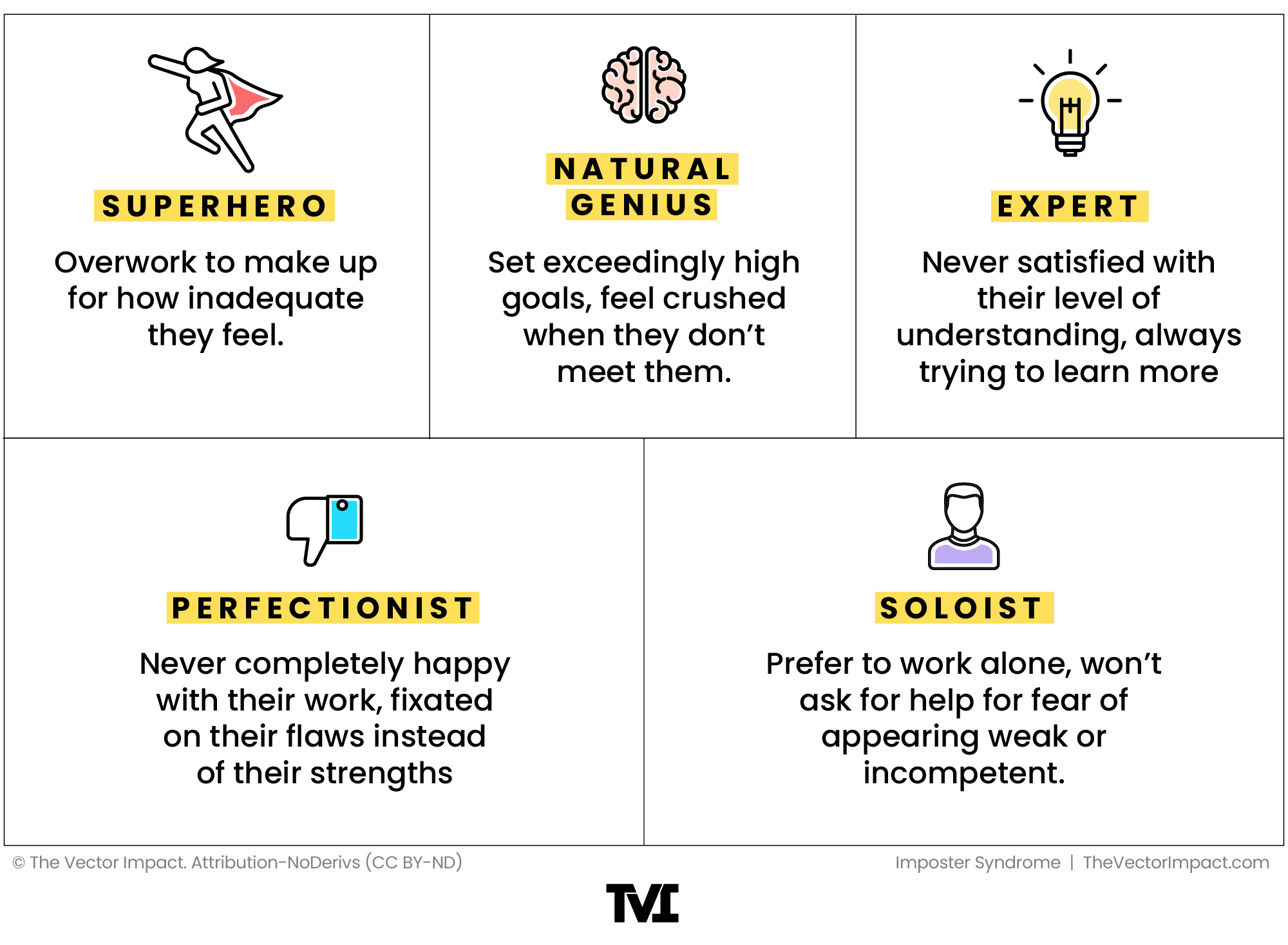
It was fall of 2017.
I had just made the biggest move of my career and life, dropping everything to relocate from Sydney, Australia, to Shanghai, China. I was transferred by my company and tasked with building a marketing team from scratch. This team would help drive sales for almost half of the country’s business. *Gulp*
I was just 27.
In my first month, I was invited to have lunch with travel agency CEOs. My own CEO told me that he believed I would influence the office of 150, thanks to my experience working in another country and my Chinese heritage.
I went on business trips to regional offices and had to create a marketing plan and present it to a room of 60 people—all of whom were older than me.
The entire time, I heard this voice in my head.
“You don’t belong here.”
“You’re a fraud.”
“They’re going to figure out that you have no idea what you’re doing.”
I was suffering from the dreaded imposter syndrome. And I wasn’t alone.
Imposter syndrome affects almost all of us.
7 in 10 people have reported feeling imposter syndrome at some point in their lives. Even the most seemingly successful women out there have experienced it, including Tina Fey, Natalie Portman, and Sheryl Sandberg.
Whether it’s facing your fears, getting a promotion, or starting your own freelance business, imposter syndrome is always there, reeling its ugly head. But that doesn’t mean that you have to let it control you, “fake it till you make it,” or even let it affect the decisions you make.
You can face imposter syndrome head-on, just like I did.
And you absolutely CAN overcome it.
In this post, I’ll take you through the steps I used to conquer imposter syndrome and how I came out a stronger person.
Ah, the impostor syndrome!? The beauty of the impostor syndrome is you vacillate between extreme egomania and a complete feeling of: ‘I’m a fraud! Oh god, they’re on to me! I’m a fraud!’ So you just try to ride the egomania when it comes and enjoy it and then slide through the idea of fraud. Seriously, I’ve just realized that almost everyone is a fraud, so I try not to feel too bad about it.
What is imposter syndrome?
Imposter syndrome is a psychological phenomenon where a person doubts their abilities, skills, or accomplishments—so much so that they feel like they’re going to be exposed as a fraud or undeserving of their success. This feeling persists no matter how much evidence that person is given to the contrary that proves they’re deserving of the position or situation that they’re in.
Some of the most common signs of imposter syndrome include:
- The belief that you don’t deserve to be in the position that you’re in
- An inability to objectively assess your level of competence, abilities, or skills
- Crediting your success to external factors, such as luck, networking, or misjudgment by others
- A fear that you won’t or can’t live up to the expectations placed on you
- Self-sabotage or self-doubt
Within the broader phenomenon of imposter syndrome, people find themselves coping in different ways. Some set crazy ambitious goals, then get disappointed when they don’t meet them. Others are too scared to ask for help because they’re worried that they’ll look like a phony or overwork themselves to compensate for their perceived inadequacies.
The 5 types of imposter syndrome
Imposter syndrome can manifest in a number of different ways. Dr. Valarie Young, founder of The Imposter Institute, breaks it down into five different types of imposter syndrome. Let’s look at each one, to see how it might be showing up in you:
The Perfectionist
If you’ve ever spent three hours perfecting an email that should take five minutes, you might be dealing with perfectionist-type imposter syndrome. Perfectionists are trapped by the belief that anything less than flawless work will expose them as frauds.
This isn’t just about wanting to do good work—it’s about being paralyzed by the fear that any mistake proves you don’t belong. Perfectionists often miss deadlines because they can’t stop tweaking details, or they avoid starting projects because they’re terrified of producing something imperfect.
At work, a perfectionist might rewrite the same report seven times, convinced that one typo will ruin their reputation. In school, they might skip submitting assignments rather than turn in work they consider subpar, missing valuable learning opportunities due to fear of being wrong.
If any of this sounds like you, definitely check out our article about learning how to focus on progress not perfection.
The Expert
Ever avoided applying for a job because you only met 8 out of 10 requirements? That’s classic Expert imposter syndrome. These folks are convinced they need to know everything before they can contribute anything.
Experts live in constant fear of being asked a question they can’t answer. They over-prepare for everything, spending hours researching topics just to avoid looking uninformed. Even when they clearly know their stuff, they downplay their knowledge with phrases like “I could be wrong, but…”
Picture the student who won’t raise their hand in class unless they’re absolutely certain their answer is perfect, or the employee who stays silent in brainstorming sessions because they worry their ideas aren’t fully developed. They’re missing chances to learn and contribute—and actually become experts—because they think expertise means never being uncertain.
Related: Be a Lifelong Learner: 5 Ways To Mix Learning Into Your Weekly Routine
The Soloist
If you’re the type who likes to go it alone, and think you should be able to figure out everything yourself, then you may be showing imposter syndrome as a Soloist.
Soloists believe asking for help reveals weakness and incompetence. This drive to be independent leads them to struggle in silence rather than seek guidance, support, or collaboration.
They often frame needing help as personal failure, viewing teamwork and mentorship as crutches rather than normal parts of professional and academic growth. This isolation frequently leads to increased stress and missed opportunities for learning and connection.
Related: How to find a career mentor who will help you grow
At work, a soloist might spend days trying to solve a technical problem alone instead of asking a colleague who could help in minutes. In academic settings, they might fail a class rather than attend study groups or seek tutoring, viewing these resources as admissions of inadequacy rather than smart study strategies.
The Natural Genius
When you’re practicing a new skill, how much patience and time do you give yourself to master it? If you believe that all new abilities should come quickly and easily, you may be exhibiting Natural Genius behavior.
The problem comes when they encounter something genuinely challenging. Since they’re accustomed to immediate success, any struggle or need for practice feels like proof they’re not actually smart. They start thinking, “If I were really talented, this would be easy.”
Natural geniuses often abandon new pursuits at the first sign of difficulty. A student might drop a challenging math course after one confusing lecture, convinced they “just aren’t a math person.” At work, someone might avoid learning new software because the initial learning curve feels overwhelming and embarrassing.
The Superhero
Superheroes have convinced themselves that they need to excel in every single area of life—work, relationships, fitness, hobbies, you name it. They’re the people working 60-hour weeks while training for marathons and maintaining perfect social lives, all while secretly feeling like they’re barely keeping up.
This type stems from the belief that they’re only valuable when they’re outperforming everyone around them. Taking breaks feels dangerous. Saying no to opportunities seems impossible. They’re constantly afraid that slowing down in any area will expose them as ordinary.
You might see this in a college student who takes six classes, works two jobs, volunteers, and leads three clubs—then feels inadequate when they’re exhausted. In the workplace, it’s the person who stays late every night and volunteers for every project, sacrificing their health and relationships because rest feels like giving up.
What causes imposter syndrome?
Imposter syndrome was first identified in 1978, although back then it was referred to as the “imposter phenomenon.” Researchers originally thought it occurred among high-achieving women. Today we know that it affects people of all genders, ages, and positions—from entry-level cadets to high-flying executives.
But why exactly do we get this feeling in the first place?
The sense of being an imposter or fraud doesn’t happen overnight.
It’s typically caused by a variety of factors, and often they layer on top of one another and make imposter syndrome even harder to identify and deal with.
I’m going to break down some of the common circumstances that can create imposter syndrome, but first, two important things to note:
✴️ 2. It’s not always necessary to understand the root cause of imposter syndrome in order to start managing it. There are practical things you can do to start improving imposter syndrome, even if you don’t understand exactly why you experience it. More on that later in this article.
For now, let’s look at some of those common causes of imposter syndrome:
Childhood and family dynamics
Many cases of imposter syndrome can be traced back to early experiences with praise and criticism. If you grew up in a family that emphasized achievement above all else, you might have learned that your worth depends on constant success. Parents who only celebrated perfect report cards or first-place finishes can inadvertently teach kids that anything less than the best isn’t good enough.
On the flip side, some people develop imposter syndrome from being labeled “the smart one” or “the talented one” in their family. When your identity becomes tied to being naturally gifted, struggling with anything feels like evidence that you’ve been fooling everyone all along.
Personality traits and mental health
Certain personality traits make people more susceptible to imposter syndrome. Perfectionism is a big one—if you believe there’s only one “right” way to do things and that way happens to be flawless, you’re setting yourself up for constant feelings of inadequacy.
Anxiety and low self-esteem also create fertile ground for imposter thoughts. When you’re prone to worry or self-doubt in general, it’s easier to convince yourself that your successes are flukes and your failures are proof of your incompetence.
Transitions and new environments
The most common trigger for imposter syndrome is change. Starting college, landing your first “real” job, getting promoted, or moving to a new city can all spark feelings of not belonging. When everything is unfamiliar, it’s natural to question whether you have what it takes to succeed in this new environment.
This is especially true when you’re the “first” or “only”—the first in your family to attend college, the only young person on your team, or the only person of your background in a particular field. Without role models who look or sound like you, it’s harder to believe you truly belong.
By the way, we have resources that can help boost your confidence when navigating these tricky moments in life:
Social and cultural pressures
Social media doesn’t help matters. Constant exposure to other people’s highlight reels makes it easy to believe everyone else has it figured out while you’re just barely keeping up. LinkedIn posts about promotions, Instagram photos from exotic vacations, and TikToks showcasing various talents can fuel the feeling that you’re falling behind.
Related: How to escape comparison culture
Certain industries and institutions also foster imposter syndrome through their cultures. Highly competitive environments that emphasize individual achievement over collaboration can make people feel like they need to hide any uncertainty or struggle. When asking questions is seen as weakness rather than curiosity, imposter feelings thrive.
The ups and downs of dealing with imposter syndrome
Naturally, imposter syndrome opens the door to a world of other unpleasant feelings.
When a person has imposter syndrome, they often feel the need to overwork, overperform, and overdeliver to keep from getting found out. Unsurprisingly, this leads to burnout and exhaustion: a survey from Asana found that 42% of workers experienced imposter syndrome and burnout at the same time.
It can also be crippling. Imposter syndrome causes people to avoid taking on projects so they can’t publicly fail, or because they doubt their abilities to achieve what’s needed.
Because they think they’re living undercover as a fraud, most suffer in silence for fear of being found out.
I felt this first-hand at my job in Shanghai. For the first year of working there, I got in at 8 a.m. and refused to go home before 7 p.m. I said yes to every single project. I’d spend hours and hours overanalyzing interactions with colleagues and external partners, worrying that they would think I wasn’t up to the “Senior Manager” title that I had. All of this, because I felt like I wasn’t supposed to be there—like my entire promotion had been a fluke.
Believe it or not, imposter syndrome doesn’t only come with downsides.
Research from MIT found that people who deal with imposter syndrome are rated as having stronger social skills such as empathy and interpersonal skills. This is because people with imposter-type feelings are more conscious of how their colleagues or clients perceive them, which leads them to focus more on how others feel.
Yet despite this surprising benefit of imposter syndrome, it definitely does more harm than good.
Here’s the upside: Imposter syndrome isn’t permanent
It’s absolutely possible to face your fears head-on and deal with those negative feelings. The first step is to acknowledge what’s happening and actively want to change the belief that you’re not good enough.
Once you do, there are a few steps you can take to turn the endless questions of “why me?” into “why not me?”
“Fake it till you make it”: Does it actually work?
You’ve probably heard the advice to “fake it till you make it” when dealing with imposter syndrome.
The idea is simple: Act confident even when you don’t feel it, and eventually the confidence will become real. While this approach gets criticized for being superficial, there’s actually some truth to it—but it’s not a complete solution.
The fake it till you make it strategy can be genuinely helpful in specific situations, especially when you’re trying something new. Sometimes you really do need to push yourself outside your comfort zone and try something for the first time, even when you feel unqualified. That first day at a new job, your final presentation for class, or walking into a networking event where you don’t know anyone—these moments often require you to project confidence you don’t yet feel.
The key is understanding what you’re actually “faking.” You’re not pretending to have skills you don’t possess or knowledge you haven’t gained.
Instead, you’re practicing the external behaviors of someone who belongs in that space while your internal confidence catches up. It’s like wearing a professional outfit to feel more authoritative, or speaking up in meetings even when your heart is racing. These actions can help rewire your brain to see yourself as someone who belongs.
However, the fake it until you make it approach becomes problematic when it’s your only strategy.
If you’re constantly performing a version of yourself rather than developing genuine skills and self-awareness, you’ll eventually hit a wall. Plus, the pressure to maintain a facade can actually increase anxiety and imposter feelings. You might start worrying not just about being found out as incompetent, but also about being discovered as someone who’s been pretending all along.
The most effective approach combines elements of this strategy with deeper work on building genuine confidence and skills.
Use the fake-it mentality as training wheels when you need to take action despite your fears, but pair it with real preparation, skill development, and the kind of self-reflection we’ll discuss in the sections below. That way, you’re not just acting the part—you’re actually growing into it.
Don’t bottle it up!
Your first instinct when you feel like an imposter is probably to keep it to yourself and hide in the shadows for fear of being found out.
In actual fact, this is one of the worst things you can do.
Beliefs tend to fester when you don’t talk about them. Think about it—if the only person you’re talking to about your imposter syndrome is yourself, then the conversation goes something like this:
You: You don’t belong here.
Also you: I know! All of my colleagues are secretly talking about how incompetent I am. Did you notice how nobody said anything after my last presentation?
You: Yeah, it’s because you clearly didn’t know what you were talking about. Your manager only hired you because they couldn’t find anyone better.
That’s pretty toxic, right? And yet, if one of your friends came up to you and said that, they would officially be the worst friend ever.
Break the vicious circle and confide in a good friend, a mentor, or a loved one. They’ll be able to provide you with some much-needed perspective on the situation, and it also takes a lot of the weight off your shoulders. More often than not, they’ll come back with something like “I thought I was the only one!”—helping you to realize that you’re not alone.
If you’re not comfortable speaking to someone you know, consider speaking to a therapist or psychologist. As a third party, these trained professionals offer an objective view of the situation and can even provide you with tools to better navigate imposter syndrome in the future.
Challenge your belief system
I know—you feel like you’re a fraud, so you must be, right?
But what if you challenged this thought instead of taking it as the absolute truth?
The next time those dreaded feelings of imposter syndrome creep up, try to approach it rationally and come up with a counter-argument to every negative thought.
Think you’ve tricked all of your colleagues and sooner or later they’re going to find out you’re an imposter? Let’s get real: fooling everyone would be pretty hard and fairly unlikely, especially if you still have your job.
Believe that you’re not qualified enough for that prestigious college? Remember: colleges receive thousands of applications every semester and scrutinize them all in detail. If they didn’t think you had what it takes, you wouldn’t have made the cut.
As you start to question your own beliefs about being an imposter and look for evidence to the contrary, you’ll quickly begin to realize that many of your assumptions simply aren’t true. Do this enough, and these feelings will carry a lot less weight in the future.
Look for support
Even the strongest of trees won’t survive without a deep network of roots. When you’re feeling alone, it helps to have people that you can count on.
Forge a network of coworkers, classmates, and friends who support you and who you trust to tell you the truth. These people will provide a much-needed fresh perspective on your situation and can offer guidance to you if you’re feeling alone. It’s also a good opportunity for you to provide the same type of support to people you care about, so everyone can overcome their challenges together.
Ditch the comparisons
Comparison is the thief of joy.
—Theodore Roosevelt
Look on any social media platform, and you’ll find people who are doing more, achieving more, and being more. The same goes for the office or the classroom: when you search for it, you’ll always find someone who does something better than you.
The thing is, if you’re constantly comparing yourself to others, you’re going to always focus on your flaws—rather than the stuff you’re actually good at. You’re also not getting the whole story.
For example, that colleague who just landed a promotion may have been passed over for multiple jobs beforehand, or that friend who started their own business might have sacrificed a lot of other things to reach that milestone.
Rather than always comparing yourself to others, hone in on what you’re good at. Everyone has their own abilities, strengths, and flaws. It’s about recognizing these in yourself and focusing on what’s important to you.
Don’t let it hold you back
Imposter syndrome is only debilitating if you let it be. You know that saying, “feel the fear and do it anyway?” That’s 100% applicable here. The key is to pursue your goals in spite of how you feel, even if you feel like you don’t belong.
More importantly, be kind to yourself. You don’t have to be perfect to reach your goals, and nobody expects you to be. When you let go of the idea that you have to measure up to other people’s standards, you’ll thrive and perform at your best—whether at work, school, or in your personal life.


















Joy says:
Thank you for writing this. I am currently working on my imposter syndrome, which is the Expert type, and your tips are very helpful. 🙂
Anna Schmohe says:
I see you, my fellow perfectionist! Glad it was helpful. 🙂